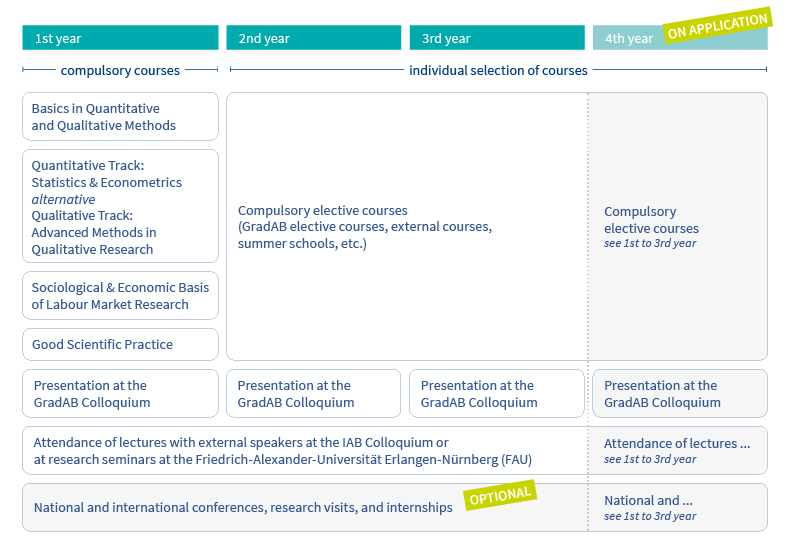Compulsory courses

The interdisciplinary study programme provides in-depth theoretical, methodological and empirical skills in the field of labour market research. There is a quantitative and a qualitative track.
During the first year of the programme, all doctoral students participate in four compulsory courses:
- All GradAB participants: “Basics in Quantitative and Qualitative Methods”
- GradAB participants in the quantitative track: “Statistics and Econometrics”
- GradAB participants in the qualitative track: “Advanced Methods in Qualitative Research”
- All GradAB participants: “The Sociological and Economic Basis of Labour Market Research”
- All GradAB participants: “Good Scientific Practice”.
Compulsory elective courses
In the second year, doctoral students start to participate in compulsory elective courses to extend their knowledge about advanced theories and empirical methods in economics, sociology and survey methodology. Doctoral students can either complete all necessary compulsory elective courses within the IAB, or they can participate in external courses, e.g. within the framework of the "Bavarian Graduate Program in Economics (BGPE)" or in Summer Schools.
To successfully complete the compulsory and compulsory elective courses, doctoral students have to fulfil the respective examination requirements.
Presentation of own research in the GradAB jour fixe meetings
All doctoral students are required to present the progress of their research in annual GradAB jour fixe meetings, which are open to all members of the Institute.
Research seminars
Research seminars of the IAB Colloquium or the School of Business and Economics of the University of Erlangen-Nuremberg (FAU) give doctoral students the opportunity to gather inspiration for their own work and to discuss new and ongoing projects with external researchers.
Internships, conferences, national and international research visits
Doctoral students have the opportunity to attend scientific conferences, participate in national and international research visits, or to do an internship at a political or social organisation.
Graduation
After the doctoral students have passed all examinations of the study programme and successfully completed their dissertation, the FAU or one of the other cooperating universities (depending on the affiliation of the supervising professor) will grant the doctoral degree. The promotion regulations of the respective university apply.
Past compulsary elective courses
2024
- Causal Machine Learning, Professor Aderonke Osikominu
- Introduction to R, Dr Andreas Filser
- Policy Experiments, Prof Patrick Arni
- Writing, Presenting and Publishing Research Papers, Professor Claus Schnabel
2023
- Writing, Presenting and Publishing Research Papers, Professor Claus Schnabel
- Questionnaire Design, Dr. Pamela Campanelli
2022
- Macroeconomics of the Labour Market, Professor Christian Merkl
- Writing, Presenting and Publishing Research Papers, Professor Claus Schnabel
- Causal Machine Learning, Professor Aderonke Osikominu
2021
- Event History Analysis, Professor Michaela Kreyenfeld
- Estimation of Duration Models, Professor Arne Uhlendorff
- Writing, Presenting and Publishing Research Papers, Professor Claus Schnabel
- Machine Learning, Dr Thomas Fackler
- Globalization and Labour Market Outcomes, Professor Hans-Jörg Schmerer
- Changes in the Labour Market, Professor Alexandra Spitz-Oener
2020
- Writing, Presenting and Publishing Research Papers, Professor Claus Schnabel
- Python and Pandas, PD Johannes Ludsteck
- Introduction to Matching and Weighting Estimators, Professor Marco Caliendo
2019
- Networks, Professor Andrea Galeotti
- Labour Market and Health, PD Thomas Lampert
- Writing, Presenting and Publishing Research Papers, Professor Claus Schnabel
- Distribution and Redistribution of Income, Professor Andreas Peichl
2018
- Machine Learning, Malte Schierholz and Christoph Kern
- Writing and Publishing Research Papers, Professor Claus Schnabel
- Programme Evaluation, Professor Uta Schönberg
- Practical tips for writing research papers, Professor Uta Schönberg
- Panel Data Analysis, Michael Gebel
2017
- Quantile Regression, Professor Bernd Fitzenberger
- Causes and Consequences of Migration, Professor Alexandra Spitz-Oener
- Topics in Labour Market Research, Professor Annette Bergemann and Professor Gerard van den Berg
2016
- Limited dependent variables, Professor Ralf Wilke
- German Establishments' Personnel Strategies during the Great Recession, Professor Lutz Bellmann
- Survey Methods, Joe Sakshaug
2015
- Polarization and Rising Wage Inequality, Professor Alexandra Spitz-Oehner (Humboldt-Universität zu Berlin)
- The Political Economy of Inequality and Redistribution, Professor Karen Anderson (University of Southampton, UK)
- Macroeconomics of the Labor Market, Professor Christian Merkl (FAU)
- Structural Equation Modelling, Professor Daniel Oberski (Tilburg University)
2014
- Causality and Identification, Professor Peter Dolton (University of Sussex)
- Advanced Methods in Event History Analysis, Professor Michael Windzio (University of Bremen)
- Designing Posters for Conferences, Professor Andrea Schwanzer (PH Ludwigsburg)
- Applied Spatial Econometrics, Dr Dani Arribas-Bel (University of Birmingham)
- Designing Questionaires, Professor Frauke Kreuter (IAB, University of Mannheim)
- Kritische Wirtschaftssoziologie, Professor Markus Promberger (IAB, FAU)
2013
- International Migration: Causes and Consequences, Professor Herbert Brücker (IAB)
- Quantile Regression, Professor Bernd Fitzenberger (University of Freiburg)
- Welfare State and Social Policy, Professor Monika Jungbauer-Gans (University Hannover)
- Survey Methods, Professor Frauke Kreuter (IAB)
- Macroeconomics of the Labor Market, Professor Christian Merkl (FAU)
- Methods of Policy Evaluation, Professor Johannes Schmieder (Boston University)
